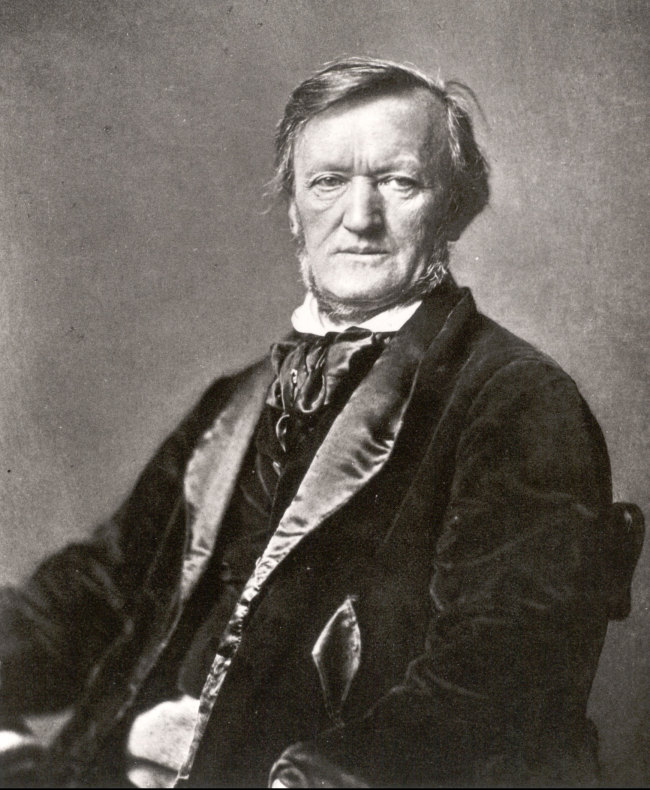Korea has been rather unfamiliar with German composer Wilhelm Richard Wagner (1813-1883) except for a few excerpts from works such as the “Wedding March” from “Tannhauser.” Some of his operas have never been staged here and his works have been cherished by only a rather small group of fans who proudly call themselves Wagnerian.
In celebration of the 200th anniversary of Wagner’s birth, an international movement focusing on and promoting Wagner has landed in Korea.
From looking inside the personal life of Wagner to premiering his operas, holding concerts and publishing books, Wagnerians and classical music lovers are set to promote the composer referred to as an “obvious genius” of his time.
 |
Portrait of Wilhelm Richard Wagner (1813-1883). (Bayreuth 2013) |
Balancing drama with music
Critics credit Wagner for making a “perfect balance” between drama and music for his operas.
“While many other opera composers weighed on the music more than drama, Wagner tried to set the balance. That may be why his pieces are so long ― the music and the drama closely support each other in the same portion,” said Lim Chae-heung, a Wagner expert.
“He didn’t particularly push an aria to represent the piece and instead molded the whole piece with the grand and affluent sound of strings and wind sessions. But most of his works are quite long because Wagner was a very expressive person and he tended to put all of what he wanted to say in a single piece. Some of his later masterpieces span five hours, which invites criticism of being ‘tedious,’” he added.
“While many other operas had a clear theme such as love, friendship, loyalty or revenge within the pieces, Wagner had more of a universal, philosophical and complex world with dozens of main characters on one stage reflecting the real world in the most realistic way,” said Kim Min, an honorary professor at Seoul National University.
But for that reason, Wagner demands greater effort from singers and musicians, limiting people’s access to his legacy, Kim said.
“Every note has a meaning, tied with the drama. Therefore, it is essential for the musicians and singers to not only learn the notes and some background information but intensively delve into the overall philosophy of Wagner.
“Added to the high-level technique required to just play the works, such demands have made a particular species of musician ― ‘Wagnerian violinist,’ ‘Wagnerian specialist singer’ and others, who have repeatedly played his music and can dare to give a performance at many occasions. The limited number of Wagner-specialists has limited Wager performances to the public,” Kim said.
Political propaganda
Koreans’ unfamiliarity may have stemmed from the composer’s alleged chauvinism, on top of widespread rumors about his womanizing.
But more so, Wagner has been taboo in some parts of the world because his music has been often associated with the Nazis.
Wagner was a confirmed anti-Semite who even released a paper against Jews and Semitism. Adolf Hitler was reportedly impressed with the merry and positive portrayal of the Germans in “Die Meistersinger,” and used some of the music to accompany the inaugural celebrations of the Third Reich in 1933.
Wagner’s descendants’ collaborations with the Nazis, the engineers of the Holocaust, led to his music being de facto-banned in some countries. For his 200th anniversary of his birth, Wagner’s hometown of Leipzig unveiled a life-sized bronze statue of the composer with a black shadow several times his diminutive height looming behind him, reflecting the criticism.
“But I would say in his music there is not so much of such ideology or sentiment,” Lim said. “The messages are universal and individualistic. Just because Wagner is not a respectable persona, I don’t think you should hate or undervalue the music.”
 |
Parsifal. (www.wagneropera.net) |
Tribute to Wagner
The Wagner Society Korea, founded in 1993, has recently published a memoir, “Wagner and Us,” depicting key members’ personal memories of Wagner’s music. The rather exclusive group composed of music critics, musicians, scholars and businessmen as well as others has held a series of concerts featuring excerpts from his works to honor the 200th anniversary.
The Korea National Opera is premiering “Parsifal,” the German composer’s last piece, at the Seoul Arts Center Opera Hall on Oct. 1-5. The “adagio opera,” loosely based on a 13th century epic poem of the Arthurian knight Parzival (Percival) and his quest for the Holy Grail, is expected to bring audience into the slow, emotional but at the same time solemn world of Wagner.
The opera company is also planning to stage the four-part “Der Ring des Nibelungen” next year, too.
“Getting to know Wagner is not an easy task. You need to listen to it over and over again to even understand his music. But it is worth trying,” said Kim Min, advisor to the orchestra for “Parsifal.”
“We say Wagner’s music is like ‘drugs’ and you can’t get away from the ecstasy once you get to know the charms,” said Seo Jeong-won, business director of Wagner Society Korea, who refers to himself as “Garden Seo.”
By Bae Ji-sook (
baejisook@heraldcorp.com)





![[Herald Interview] 'Trump will use tariffs as first line of defense for American manufacturing'](http://res.heraldm.com/phpwas/restmb_idxmake.php?idx=644&simg=/content/image/2024/11/26/20241126050017_0.jpg)


![[Herald Review] 'Gangnam B-Side' combines social realism with masterful suspense, performance](http://res.heraldm.com/phpwas/restmb_idxmake.php?idx=644&simg=/content/image/2024/11/25/20241125050072_0.jpg)
![[Health and care] Getting cancer young: Why cancer isn’t just an older person’s battle](http://res.heraldm.com/phpwas/restmb_idxmake.php?idx=644&simg=/content/image/2024/11/26/20241126050043_0.jpg)